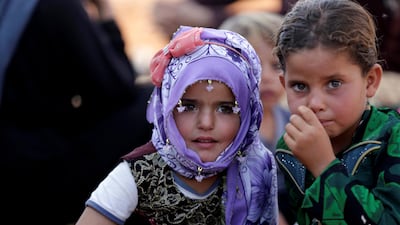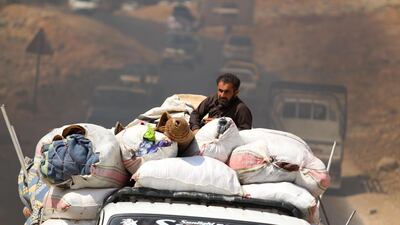Nearly 40,000 people have fled their homes in the Syrian province of Idlib over the past two weeks, as fears of a devastating government offensive remain high despite a brief lull in air strikes.
The number of displaced people has grown by around 8,000 since Monday, coming amid more dire warnings from aid groups and the international community about the impact of a government attack.
Panos Moumtzis, United Nations regional humanitarian coordinator for the Syria crisis, said Thursday that the GPS coordinates of more than 200 protected sites – including hospitals and schools – had been shared with Russia and Turkey.
"A hospital is a hospital and has to be respected by all on the ground," Mr Mountzis said, adding that four health facilities had been hit by air strikes in the past week alone.
The Syrian government has promised to recapture the entirety of the rebel-held province, and its forces have surrounded the area over the past few weeks. Speculation that an attack was imminent began earlier this month when Russian jets resumed air strikes and government forces continued shelling after a respite.
The UN has said the battle for Idlib could provoke the “worst humanitarian catastrophe of the 21st Century” and has revised upwards its estimate of the number of people who could be displaced in the event of a ground offensive from 800,000 to 900,000. The UN Special Envoy for Syria, Staffan de Mistura, is to host senior officials from Egypt, France, Germany, Jordan, Saudi Arabia, Britain and the US about the crisis in Geneva on Friday.
Around 38,500 people have already fled to areas further north, closer to the Turkish border. But the situation remains fluid, with around 4,500 having "spontaneously returned,” according to the UN humanitarian agency.
______________
Read more:
Opinion: If Idlib falls to the regime, Erdogan's whole borderlands strategy could fall
UN war crimes team documents further Syrian regime use of banned chlorine
Russia pre-empts Idlib offensive with smear campaign
______________
That confusion is likely to continue for some time, as nearly three million civilians in Idlib await their fate. The past three days have seen a brief lull in bombardment, raising speculation that the Syrian government may not yet be ready to launch an attack.
Turkish Defence Minister Hulusi Akar said Thursday that Ankara was “working intensively with Russia, Iran and our allies” to prevent an attack and stabilise the rebel-held region, according to the state-run Anadolu news agency.
Mr Moumtzis, the UN official, quoted a Russian official as saying that "every effort to find a peaceful solution to the problem is being made." But alternatives to a diplomatic alternative appear to have dimmed following failed talks between Russia, Turkey and Iran last week.
Turkey has a significant military presence in Idlib and backs a number of rebel groups there. Ankara is desperate to avoid an attack that would send another wave of refugees to its borders – it currently hosts 3.5 million Syrians.
But complicating matters is the presence of former Al Qaeda affiliate Hayat Tahrir Al Sham (HTS), whose estimated 10,000 fighters control around two thirds of the province.
Turkey and Russia both agree that HTS cannot stay, but Turkey is advocating a more careful approach.
Since talks failed to find a solution last week, Turkey has sought to deter the Syrian government through the bolstering of its military capabilities and that of its allies.
A senior rebel commander told Reuters on Wednesday that Turkey had pledged “complete military support for a long, protracted battle” and sent significant shipments of weapons and ammunition. Activists also reported seeing Turkey reinforcing its military observation posts inside the province.
“Turkey is attempting to discourage an attack on Idlib through a number of means. One is diplomacy and negotiation with its Astana co-sponsors Iran and Russia, but another is shoring up Idlib’s rebels so Damascus and its allies understand an offensive will come at a real cost,” said Sam Heller, a senior analyst at Crisis Group.
Meanwhile, France reiterated a warning to Assad’s regime on Thursday against using chemical weapons.
French Foreign Minister Jean-Yves Le Drian said the use of banned substances would be a “red line” that would have consequences.
The US has made similar warnings in recent weeks.

















